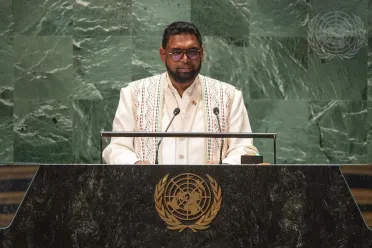Statement
Statement summary
MOHAMED IRFAAN ALI, President of Guyana, said that multilateralism remains the most effective approach to address challenges, especially climate change. “We are all experiencing its devastating effects. The difference, however, is our capacity to respond,” he said, adding that small island developing and low-lying coastal States are among the hardest hit and require adequate financing while the commitments by developed countries, including the pledge of $100 billion per year, remain unfulfilled. “As a country with the second highest forest cover per capita in the world, we know the importance of forests in mitigating the effects of climate change at the global level,” he stressed, highlighting that Guyana was issued 33.4 million tons of carbon credits under the first such programme in the world, having secured $750 million for the period 2016-2030. However, he warned that about 900 million people in developing countries have no access to electricity and that global ambition of net zero by 2050 is not currently realistic.
Speaking about the implementation of the 2030 Agenda, he said that the existing financial architecture is incapable of addressing current global challenges and must be reformed. By 2030, it is estimated that nearly 670 million people will suffer from undernourishment, he warned, adding that global agrifood systems must be urgently transformed. Condemning the weaponization of food as an instrument of war, he said: “We have noted that since the war began in Ukraine more than a year ago, the developed world provided about $220 billion in support to Ukraine. The World Bank added more than $37.5 billion in emergency financing; almost $260 billion mobilized in less than two years.” On the other hand, he continued, aid to the Palestinian people over 26 years amounted to $40 billion, Haiti received over $20 billion in aid for reconstruction and development over the past 60 years and African countries got $113 billion for 2015 and 2016 to fight hunger. He said that Guyana unequivocally supports the principle of sovereignty and territorial integrity as enshrined in the Charter of the United Nations and remains in full solidarity with the people of Ukraine and what they justly require from the international community. “However, I cannot overlook the disparity in the approach to other countries and regions of the world. This must be corrected,” he emphasized, adding that the Russian Federation’s invasion must end and greater diplomatic efforts must be made to bring an end to the war.
Turning to regional issues, he said that the ongoing crisis is Haiti is of grave concern, therefore urgent and decisive action must be taken to secure a comprehensive solution. He commended the offer by the Governments of Kenya and Rwanda to lead the multinational force in Haiti, as well as the offers by the Bahamas and Jamaica. He also called for the dismantling of the unacceptable embargo against Cuba, adding that the economic and political aggression along with the designation of Havana as a State sponsor of terrorism must come to an end.
Speaking about Venezuela’s efforts to undermine Guyana’s freedom, sovereignty and territorial integrity, he said that this issue is being dealt with by the International Court of Justice, as decided by the UN Secretary-General under the Geneva Agreement of 1966, and expressed confidence that his country’s sovereignty and territorial integrity will again be affirmed when the Court issues its final judgement. He informed that just on 19 September, Guyana received a threatening message from Venezuela in the form of a communiqué attacking his country for putting certain oil blocks in its sovereign waters up for bid. As Guyana takes its place in January 2024 as a member of the Security Council, he pledged to work to fulfil the mandate of the Council.
Full statement
Read the full statement, in PDF format.
Photo

Previous sessions
Access the statements from previous sessions.
